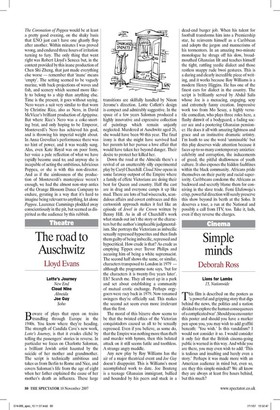The road to Auschwitz
Lloyd Evans Lotte's Journey New End Cloud Nine Almeida Joe Guy Soho Beware of plays that open on trains trundling through Europe in the 1940s. You know where they're heading. The strength of Candida Cave's new work, Lotte's Journey, is that it evades cliché by telling the passengers' stories in reverse. In particular we focus on Charlotte Saloman, a brilliant Jewish artist haunted by the suicide of her mother and grandmother. The script is technically ambitious and takes us from Berlin to Rome and Nice, and covers Saloman's life from the age of eight when her father explained the cause of her mother's death as influenza. These large transitions are skilfully handled by Ninon Jerome's direction. Lotte Collett's design is compact and admirably suggestive. In the space of a few years Saloman produced a highly innovative and expressive collection of paintings which remain unjustly neglected. Murdered at Auschwitz aged 26, she would have been 90 this year. The final irony is that she might have survived had her parents let her pursue a love affair that would have taken her beyond danger. Their desire to protect her killed her.
Down the road at the Almeida there's a revival of an unutterably silly experimental play by Caryl Churchill. Cloud Nine opens in some faraway outpost of the Empire where a family of effete Victorians are doing their best for Queen and country. Half the cast are in drag and everyone camps it up like mad. There are lots of bad wisecracks, scandalous affairs and covert embraces and this cartoonish approach makes it feel like an episode of Jewel in the Crown written by Benny Hill. As in all of Churchill's work what stands out isn't the story or the characters but the author's implacable judgmentalism. She portrays the Victorians as imbecilic sexually repressed hypocrites and then finds them guilty of being imbecilic, repressed and hypocritical. How crude is that? As crude as emptying Tippex over Trevor Philips and accusing him of being a white supremacist. The second half shows the same, or similar, characters transposed to London in 1979 — although the programme note says, 'but for the characters it is twenty-five years later'. Eh? Search me. They all meet up in a park and set about establishing a community of mutual erotic exchange. Perhaps orgygoers were racy back in 1979. Now renamed swingers they're officially sad. This makes the second act seem even more irrelevant than the first.
The moral of this bizarre show seems to be that the twisted ethics of the Victorian conquistadors caused us all to be sexually repressed. Even if you believe, as some do, that the Empire was nothing more than theft and murder with hymns, then this belated attack on it still seems futile and toothless. A strange angry muddle.
Any new play by Roy Williams has the air of a major theatrical event and Joe Guy doesn't disappoint. This is Williams's most accomplished work to date. Joe Boateng is a teenage Ghanaian immigrant, bullied and hounded by his peers and stuck in a dead-end burger job. When his talent for football transforms him into a Premiership star, he reinvents himself as a Caribbean and adopts the jargon and mannerisms of his tormentors. In an amazing two-minute monologue he shrugs off his slow, broadmouthed Ghanaian lilt and teaches himself the tight, rattling yardie dialect and those restless snappy rude bwoi gestures. This is a daring and clearly incredible piece of writing, and it works because Roy Williams is a modern Henry Higgins. He has one of the finest ears for dialect in the country. The script is brilliantly served by Abdul Salis whose Joe is a menacing, engaging, sexy and extremely funny creation. Impressive work too from Mo Sesay, a highly versatile comedian, who plays three roles here, a flashy dimwit of a bodyguard, a fading soccer ace and a pootering Ghanaian pensioner. He does it all with amazing lightness and grace and an instinctive dramatic artistry. I'm loath to use the word `unmissable' but this play deserves wide attention because it faces up to so many contemporary anxieties: celebrity and corruption, the inducements of greed, the pitiful shallowness of youth culture. It also exposes the hidden faultlines within the black community. Africans pride themselves on their purity and racial superiority. Caribbeans condemn the Africans as backward and secretly blame them for conniving in the slave trade. Femi Elufowoju's crisp, powerful direction will surely preserve this show beyond its berth at the Soho. It deserves a tour, a run at the National and possibly a call from ITV, too. Take it, lads, even if they reverse the charges.





































































 Previous page
Previous page